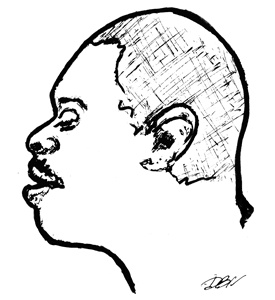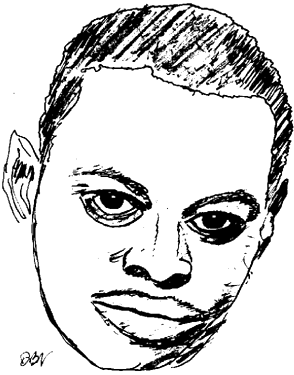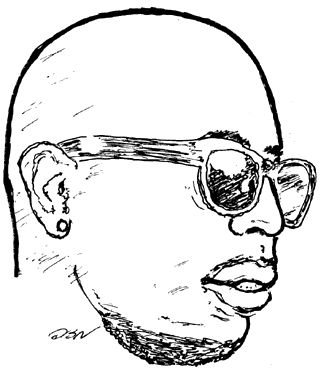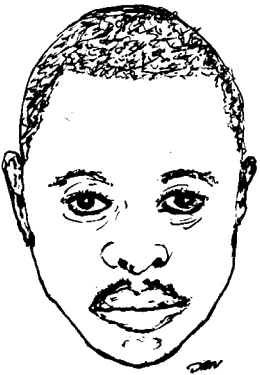


"Friday"
Sir Charles Jones: New 5-Star Album Review!
Composed by Charles Jones
Originally published in Daddy B. Nice's Album Reviews.
January 1, 2025:




 1. "Highway 55" ----- Sir Charles Jones
1. "Highway 55" ----- Sir Charles Jones
 Last year's THE CHOSEN ONE has aged well, still placing on the album charts, still showing up on deejay playlists. (Scroll down this page to TIDBITS #3 for more.) Nothing could be further from THE CHOSEN ONE'S swagger and aggressiveness than Sir Charles' latest offering, My Personal Testimony. I was immediately drawn to "Highway 55," the north/south interstate through the Mississippi Delta, in which Charles delves so deeply into personal trauma and doubt---mother and father ailing, too many people "depending" on him---that he pulls off the road and fondles a gun with thoughts of suicide. If that's not enough to emotionally anchor a set of set songs, I don't know what is. "Momma And Daddy" is more of the same, Charles on his knees praying for his parents. Fans who have followed his career from the beginning will instantly think of "Take Care Of Momma" from his debut album in 2000. Who does this kind of thing (sentiment, emotion) better? "Testify," a conversation between mother and son, strengthens and amplifies the overall theme---sober, contemplative, inward-looking---just the opposite of THE CHOSEN ONE'S brashness. The bulk of the tracks are ballads and even the mid-tempo selections like "Once Was Blind" have a taciturn and religious aspect. In fact, you might think of MY LIFE'S TESTIMONY as Sir Charles' version of gospel music. Only it's not what you think of when you think of gospel music. It's much slower and meditative.
Last year's THE CHOSEN ONE has aged well, still placing on the album charts, still showing up on deejay playlists. (Scroll down this page to TIDBITS #3 for more.) Nothing could be further from THE CHOSEN ONE'S swagger and aggressiveness than Sir Charles' latest offering, My Personal Testimony. I was immediately drawn to "Highway 55," the north/south interstate through the Mississippi Delta, in which Charles delves so deeply into personal trauma and doubt---mother and father ailing, too many people "depending" on him---that he pulls off the road and fondles a gun with thoughts of suicide. If that's not enough to emotionally anchor a set of set songs, I don't know what is. "Momma And Daddy" is more of the same, Charles on his knees praying for his parents. Fans who have followed his career from the beginning will instantly think of "Take Care Of Momma" from his debut album in 2000. Who does this kind of thing (sentiment, emotion) better? "Testify," a conversation between mother and son, strengthens and amplifies the overall theme---sober, contemplative, inward-looking---just the opposite of THE CHOSEN ONE'S brashness. The bulk of the tracks are ballads and even the mid-tempo selections like "Once Was Blind" have a taciturn and religious aspect. In fact, you might think of MY LIFE'S TESTIMONY as Sir Charles' version of gospel music. Only it's not what you think of when you think of gospel music. It's much slower and meditative.

 See the chart.
See the chart.
October 25, 2020: Daddy B. Nice's Profile
From enfant terrible to grown ass man, Sir Charles Jones has been at the center of southern soul music for more than two decades, the only recording artist to have been so highly-ranked in all three of Daddy B. Nice's Top 100 charts over the past quarter-century.
Surviving older-generation artists and professionals still tend to think of Jones as the wunderkind who made the young ladies scream and swoon, the "little-brother" prodigy who had the brass to call himself the "king" (and the arrogance to gloat about it occasionally), but in reality Charles has undergone a scarcely-noticed maturation and transformation into the elder statesman for the genre, and this despite the fact he is still only middle-aged.
The invincible legacy of his humble but tuneful signature song, "Friday," is just as dramatic. Every stanza is a tribute---not to the euphoria and privilege of being young, talented, creative and privileged, all of which describe Charles---but to the ordinary working men and women of the world and their reality, their dreams. And that is the true source of Sir Charles Jones' long-lived power.
Every southern soul fan knows the first verse of "Friday" by heart:
"This one is dedicated
For all the workers who work nine to five.
If you want to party,
Hey, it's Friday.
Let's party tonight."
Hiphop artists are fond of saying their music is all about the culture. The same is true of southern soul music. Whether it be "Mel Waiters on the radio/ Singing about the whiskey" (another couplet from Jones' "Friday") or Nelson Curry singing about "the sugar shack" (another word for "hole in the wall"), or Johnnie Taylor singing "Jody got your girl and gone" or Marvin Sease (Charles' first mentor) singing "I'm Mr. Jody," southern soul music is a celebration of the culture of the black Deep South, a civilization as exotic and foreign to most Americans as Brazilian samba or Jamaican reggae.
"Mel Waiters on the radio,
Singing about the whiskey.
I think I'll go by the store,
To get me a bottle,
So I can be ready
To get my groove on the dance floor."
Nowadays, southern soul fans take for granted that from the moment he started making records Sir Charles Jones was a chart-topper. Not so. His rise was much more gradual and bump-filled. As late as 2007 your Daddy B. Nice was writing:
The holder of the #32 position on Daddy B. Nice's original Top 100 Southern Soul Chart (90's-00's), Sir Charles Jones has moved all the way up to the #12 position. It's the highest rank accorded any member of the younger generation of Southern Soul stars, based upon the quality and the impact of Sir Charles Jones' music on the Southern Soul genre.
The artists ranking above him at that time were (in order): Johnnie Taylor, Ronnie Lovejoy, Peggy Scott-Adams, Tyrone Davis, Marvin Sease, Willie Clayton, Mel Waiters, Little Milton, Bobby Rush, Theodis Ealey and Shirley Brown. By 2010, when Daddy B. Nice's second Top 100 chart (21st Century Southern Soul) appeared, Taylor, Lovejoy, Little Milton and Tyrone Davis were dead, Marvin Sease was ailing, Peggy Scott-Adams had retired and Sir Charles had risen to the #1 spot, ahead of Mel Waiters (#2), Willie Clayton (#3), Bobby Rush (#5), Theodis Ealey (#8) and Shirley Brown (#9), an uncontested peak from which Charles would hold court for a decade.
Now it's 2020, and Charles has slipped a notch to #2 on Daddy B. Nice's new Top 100 chart, eclipsed by a former hiphopper named Big Pokey Bear, who has taken southern soul nation by storm with "My Sidepiece," a song that speaks to southern black culture with a force like a hurricane.
What does this mean?
Well, it does not mean that Sir Charles Jones has vacated his "throne" as "the king of southern soul". What it does mean is that southern soul music has grown by leaps and bounds, above and beyond what it did in the 'teens when Sir Charles topped the chart.
The story of contemporary southern soul is the tale of a marginalized art form relegated to a forgotten region of the country managing to hold on through hard times when radio air play and tour exposure were practically non-existent, and from those scant beginnings grow into a robust and vanguard-setting phenomenon, attracting the very young folks its dire forecasters were sure would spurn it, including the hiphop generation.
Artists like Pokey Bear (from hiphop) and Tucka (from zydeco and swing-out) have brought a new groundswell of support to the music that has raised the fortunes of all southern soul performers, including Sir Charles, and Charles has benefitted from the newcomers' presence both in revenue (attendance figures in the thousands) and fame.
Moreover, since the mid-teens of the 21st century, when he recorded his eponymous, jazz-inflected version of "Mississippi Boy" (with a video of himself in denim coveralls), Charles has been on quite a run, recording music (including collaborations) at a torrid pace. None of the self-effacement, silence and solitude of segments of his first decade. The "hot" Sir Charles songs these days (meaning recent years) are "Country Boy," (his lounge-jazz version of the oft-covered "Mississippi Boy"); "Trail Ride" (with Jeter Jones, no relation, with whom he teamed on the recent Jonez Boyz: Two Kings album); and "Soul Brothers Moonshine," which Charles has recorded in three different versions, making it a "shoo-in" to be his current signature single.
Meanwhile, "Friday" just keeps rolling on, as popular now as it was twenty years ago. In the early days, "Is There Anybody Lonely?" was right up there with "Friday" on the fans' want-to-hear index. "Friday" was often the Jones' opener and "Is Anybody Lonely" his closer. Most of Charles' other early standards---"Better Call Jody," "Just Can't Let Go," "For Better Or Worse,"---have a patina of history, of being vintage, about them, but "Friday" is that rare song that sounds brand new and "fresh" every time you hear it.
"It's Friday, baby,
And I'm gonna party
And get my groove on.
It's Friday,
And I'm gonna party
Till the break of the dawn."
The lyrics look so threadbare when printed out, but the music transports, and Jones imbues each word with an emotional resonance that conjures a common man for whom the weekend is the fulfilling moment of his life. And the listener is comforted by this working man's effusive testimony. The essentials of the human spirit are everywhere, even here. We hold them in common.

--Daddy B. Nice
About Sir Charles Jones: New 5-Star Album Review!
 Charles Jones Jr. was born in Akron, Ohio on April 25, 1973. His father, Charles Jones Sr., was a regional gospel singer, writer and pianist, and his mother, Blanche--originally from Birmingham, Alabama--was a longtime civil rights activist. When his parents divorced in the early eighties, Charles moved with his mother and four brothers to Birmingham. Charles was called the "little Stevie Wonder" as a small boy in the Avondale projects of Birmingham. Charles' mother, who worked three jobs, eventually bought a house in Ensley, Alabama (now a suburb of Birmingham) where Charles spent his high school years as a self-professed "gang-banger," disappointing his mother and never graduating. He did bond with the Ensley High School's band-teacher, however, and while working menial jobs with his brothers after dropping out, one of his bosses heard him singing and suggested Charles try out at a local club named the French Quarters. Charles began singing on weekends for $75 a night, and one evening the club announcer, at a loss for how to spice up Jones' ordinary name, introduced him as "Sir Charles," and the moniker stuck.
Charles Jones Jr. was born in Akron, Ohio on April 25, 1973. His father, Charles Jones Sr., was a regional gospel singer, writer and pianist, and his mother, Blanche--originally from Birmingham, Alabama--was a longtime civil rights activist. When his parents divorced in the early eighties, Charles moved with his mother and four brothers to Birmingham. Charles was called the "little Stevie Wonder" as a small boy in the Avondale projects of Birmingham. Charles' mother, who worked three jobs, eventually bought a house in Ensley, Alabama (now a suburb of Birmingham) where Charles spent his high school years as a self-professed "gang-banger," disappointing his mother and never graduating. He did bond with the Ensley High School's band-teacher, however, and while working menial jobs with his brothers after dropping out, one of his bosses heard him singing and suggested Charles try out at a local club named the French Quarters. Charles began singing on weekends for $75 a night, and one evening the club announcer, at a loss for how to spice up Jones' ordinary name, introduced him as "Sir Charles," and the moniker stuck.
 Jones met Marvin Sease in the late nineties and toured and mentored as a background singer with the chitlin' circuit star for five years. Meanwhile, he relocated to Jackson, Mississippi, where the biggest southern soul label, Malaco Records, and the most influential southern soul radio station, WMPR, had made the city the epicenter of the genre. With Sease's encouragement, Jones took a twelve-track demo to Malaco Records (also Sease's label), only to be rejected.
Jones met Marvin Sease in the late nineties and toured and mentored as a background singer with the chitlin' circuit star for five years. Meanwhile, he relocated to Jackson, Mississippi, where the biggest southern soul label, Malaco Records, and the most influential southern soul radio station, WMPR, had made the city the epicenter of the genre. With Sease's encouragement, Jones took a twelve-track demo to Malaco Records (also Sease's label), only to be rejected.
"They were looking at me like, 'Man, you crazy?'," Jones told David Whiteis, the author of Southern Soul Blues.. "Twenty-six-year-old dude singing the blues? No twenty-six-year-old know 'bout no blues....We're off into the Johnnie Taylors, and this and that.' Tommy Couch Jr. (Malaco's CEO) told me that he didn't believe in my kind of music because it didn't have the Johnnie Taylor horns; this didn't sound like Z. Z. Hill and Latimore."
Stymied, Jones was buoyed by a promo man in Malaco's employ named Senator Jones (no relation), who upon hearing the younger Jones' demos took him to his 22-acre farm outside Jackson and honed the songs for Jones' debut disc, Sir Charles Jones on Senator Jones' own imprint, Hep'Me Records. The year was 2000.
Senator Jones doubled as a wildly eccentric, early-morning deejay at Jackson's WMPR under the name "Uncle Bobo," and Uncle Bobo began playing Sir Charles Jones tunes from the debut disc, three of which---"Better Call Jody," "Take Care Of Momma" and "Hang On"---became popular in the Delta. Meanwhile Charles and Senator Jones continued to collaborate on an even better set of songs for the release of Love Machine, which would debut on Warren Hildebrand's New Orleans-based Mardi Gras Records in 2001. It would become the biggest album release by a new-generation performer to date.
The sound was different. Synthesizer washes, dirge-slow ballads, perky and idiosyncratic rhythm tracks, synthetic brass. The sound said you could go in a different direction. You didn't necessarily have to have the deep-soul keyboards and live horn sections of Malaco-produced sets.
Although it was purely Southern Soul in form, Love Machine, replete with hits--"Friday," "Is Anybody Lonely?", "Just Can't Let Go," "For Better Or Worse," "Just Like Fire"--accomplished the unprecedented task of charting on Billboard's hiphop-dominated R&B chart for more than a year, where it peaked at #26 in June 2002.
 Meanwhile, another artist in the Senator Jones stable, a deejay from Chicago named Lewis Clark (aka The Love Doctor), a strong-voiced singer in the Mel Waiters mode, had a hit single with "Slow Roll It". Written by Charles and released in 2001, "Slow Roll It" became one of the two or three undisputed Southern Soul classics of the new millennium. The tune turned the chords of the Staple Singers' "Let's Do It Again" inside out. Sir Charles can be heard singing background on the track, and Charles includes the song in his performance repertoire to this day.
Meanwhile, another artist in the Senator Jones stable, a deejay from Chicago named Lewis Clark (aka The Love Doctor), a strong-voiced singer in the Mel Waiters mode, had a hit single with "Slow Roll It". Written by Charles and released in 2001, "Slow Roll It" became one of the two or three undisputed Southern Soul classics of the new millennium. The tune turned the chords of the Staple Singers' "Let's Do It Again" inside out. Sir Charles can be heard singing background on the track, and Charles includes the song in his performance repertoire to this day.
Southern Soul, a comparatively lackluster outing, followed on the PMG label in 2002.
Jones had a near fatal motorcycle accident in 2003 in Jackson, Mississippi. The artist was in a coma for three days and slow to recover. The setback marked a turning point for Jones, who withdrew from the public. However, the LP Sir Charles Jones & Friends: A Southern Soul Party (Hep' Me 2004), a compilation album including The Love Doctor and other new artists whose style had been influenced by Sir Charles, gained an enthusiastic response, while also spawning two solid Jones hit singles, "The Letter (Guilty)" and "The Same Thing It Took To Get Her."
With the aptly-titled Thank You for Holding On (Jumpin' 2006), Sir Charles acknowledged that he had become a relative recluse. The new songs---"Running," "Come To Me Baby," "Baby Love"---while worthy additions to the Sir Charles catalog, suffered from rusty, demo-like vocals and tentative, sketchy arrangements.
For Your Love...Best of Sir Charles Jones, a greatest-hits set, was released by Mardi Gras Records in 2007.
The CD My Story (Mardi Gras, 2008), marked Jones' most accomplished set of new material since Love Machine, including the ballads "Happy Anniversary" and "You're My Latest, My Greatest (Inspiration)" and the dance jam "I Came To Party." With its acoustic sound and lush string choruses, the anthem-like "Happy Anniversary" in particular marked a post-Love Machine peak and major step forward in Jones' evolving stylistic approach.
Tribute To The Legends, in which Charles covered R&B standards he himself performed before he became a solo recording act, was released on Mardi Gras Records in 2009. However, the reception was muted. The reaction of the fans was that Sir Charles was still in a "holding pattern" creatively-speaking, and that, with the possible exception of "My Story," Charles had not fulfilled the great potential promised in "Love Machine".
Looking back on Sir Charles Jones' career from the vantage point of 2020, when his influential and exalted position within southern soul music seems a given, the surprising statistic is the paucity of his recordings since the glory days of "Friday," "Is There Anybody Lonely" and "Slow Roll It," when his concerts were the black version of Beatlemania.
Charles' most esteemed rival, T.K. Soul, out-recorded him mightily through the latter half of the first decade and on into the second decade. Ecko Records artist O.B. Buchana produced close to an album a year over the same time period, as did independently-produced Big G. And yet, over the decade following "A Tribute To The Legends," Sir Charles Jones released only two long-play albums. Portrait Of A Balladeer arrived after a five-year hiatus. Astonishingly, and for reasons never explained, the album almost immediately went out of print, not to be re-issued until 2019. Daddy B. Nice gave "Portrait Of A Balladeer" a five-star-rated review in October of 2014, noting:
But the songs themselves constitute the best assortment of new Sir Charles material in a decade, a soulful fabric far richer than MY STORY, a set sophisticated enough to hark back to the definitive LOVE MACHINE. The songs all vary, but they all have that Sir Charles sound: a modern-day Johnny Mathis forged in a cauldron of the blues.
After another fallow period, the album The Masterpiece arrived in 2018, and it garnered Jones "man of the year" status in Daddy B. Nice's annual Best Of The Year wrap-up:
****************2018: THE YEAR IN SOUTHERN SOUL
 In addition to a bevy of collaborations for which he’s always been in the highest demand, top-rated recording artist Sir Charles Jones dominated 2018 with a new album, “The Masterpiece”. The hubristic title raised sky-high expectations and begged comparisons to “The Love Machine,” the classic that launched Jones’ career. The singles “Step It Out” (with Prince Damons), “Squeeze Me,” “Call Me” (with Calvin Richardson and Omar Cunningham)” and “100 Years” charted #1 (January), #1 (May), #2 (May) and #1 (August) respectively on Daddy B. Nice’s monthly Top 10 Singles.
In addition to a bevy of collaborations for which he’s always been in the highest demand, top-rated recording artist Sir Charles Jones dominated 2018 with a new album, “The Masterpiece”. The hubristic title raised sky-high expectations and begged comparisons to “The Love Machine,” the classic that launched Jones’ career. The singles “Step It Out” (with Prince Damons), “Squeeze Me,” “Call Me” (with Calvin Richardson and Omar Cunningham)” and “100 Years” charted #1 (January), #1 (May), #2 (May) and #1 (August) respectively on Daddy B. Nice’s monthly Top 10 Singles.
 Sir Charles was also a prime influence for artist P2K Dadiddy’s 5-star-rated debut album, “Welcome To The Boom Boom Room,” which included an outright Sir Charles homage, “Soul Brothers Moonshine,” a collaborative effort (Sir Charles, P2K and Jeter Jones) on which Charles also sang the opening verse. The song was so steeped in Sir Charles Jones musical lore it could have graced “The Masterpiece”.
Sir Charles was also a prime influence for artist P2K Dadiddy’s 5-star-rated debut album, “Welcome To The Boom Boom Room,” which included an outright Sir Charles homage, “Soul Brothers Moonshine,” a collaborative effort (Sir Charles, P2K and Jeter Jones) on which Charles also sang the opening verse. The song was so steeped in Sir Charles Jones musical lore it could have graced “The Masterpiece”.
Whether “The Masterpiece” was the crowning achievement of the King of Southern Soul’s career was debatable--fans would probably still give “Love Machine” that honor--but there was no disputing the quality of the lyrics, which eclipsed “Love Machine’s” youthful yearnings with the ruminations of a grown man.
 In "Squeeze Me," the song that blended the best of the new and old Sir Charles, the troubadour sang, “Said it’s been three years now,/ And you still don’t see/ How much you mean to me./ I know, baby, I’m a man./ He did you wrong,/ But don’t make me pay/ For the other man’s mistakes."
In "Squeeze Me," the song that blended the best of the new and old Sir Charles, the troubadour sang, “Said it’s been three years now,/ And you still don’t see/ How much you mean to me./ I know, baby, I’m a man./ He did you wrong,/ But don’t make me pay/ For the other man’s mistakes."
And in "100 Years," Charles opined, “When God made a soul/ He split that soul in two./ He gave half to me,/ And the other half to you./ As fate would have it,/ The day came when we met./ Friends called me Romeo/ And you Juliet./What are you doing/ For the next one hundred years?”
***************
Since 2018, Sir Charles Jones has been on an artistic tear. Always graciously accepting of collaboration requests (it would be easier to list the artists he hasn't collaborated with than those with whom he has: see Tidbits #2 below), Charles has set an even more torrid pace in 2019 and 2020. And his album productivity has soared. He's released three albums of new collaborative and solo material: Sir Jones & Family Vol.1 (2019), Intimacy (2020) and The Jones Boyz: 2 Kings (2020) with Jeter Jones---also no relation. Album alerts and reviews of these CD's can be found at Daddy B. Nice's 21st Century Artist Guide to Sir Charles Jones.

Tidbits


 As most everyone conversant with southern soul music knows, Sir Charles Jones and Jeter Jones (no relation) got together in 2020 to produce The Jones Boyz: Two Kings". The collaborative album was successful, not to mention a validation for Jeter Jones, who had written and sung his way from obscurity to the top rank of southern soul artists, a moment further memorialized at the onset of the Sir Charles "Still In Love" video, when Charles welcomes an exhausted, road-tripping Jeter Jones into his studio with, "I know you're tired, man." The two performers brought out the best in one another, but who knew at the time that the partnership would also stimulate their future, individual work?
As most everyone conversant with southern soul music knows, Sir Charles Jones and Jeter Jones (no relation) got together in 2020 to produce The Jones Boyz: Two Kings". The collaborative album was successful, not to mention a validation for Jeter Jones, who had written and sung his way from obscurity to the top rank of southern soul artists, a moment further memorialized at the onset of the Sir Charles "Still In Love" video, when Charles welcomes an exhausted, road-tripping Jeter Jones into his studio with, "I know you're tired, man." The two performers brought out the best in one another, but who knew at the time that the partnership would also stimulate their future, individual work?

Honorary "B" Side
"Is There Anybody Lonely?"






























































©2005-2025 SouthernSoulRnB.com
All material--written or visual--on this website is copyrighted and the exclusive property of SouthernSoulRnB.com, LLC. Any use or reproduction of the material outside the website is strictly forbidden, unless expressly authorized by SouthernSoulRnB.com. (Material up to 300 words may be quoted without permission if "Daddy B. Nice's Southern Soul RnB.com" is listed as the source and a link to http://www.southernsoulrnb.com/ is provided.)
